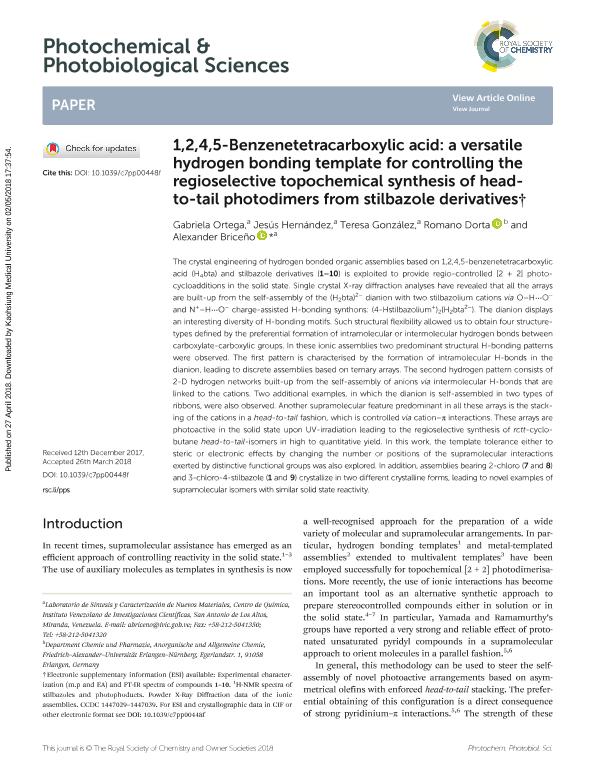Mostrar el registro sencillo del ítem
dc.contributor.author
Ortega Moreno, Gabriela Andreines

dc.contributor.author
Hernández, Jesús
dc.contributor.author
González, Teresa
dc.contributor.author
Dorta, Romano
dc.contributor.author
Briceño, Alexander
dc.date.available
2020-03-06T13:34:00Z
dc.date.issued
2018-03
dc.identifier.citation
Ortega Moreno, Gabriela Andreines; Hernández, Jesús; González, Teresa; Dorta, Romano; Briceño, Alexander; 1,2,4,5-Benzenetetracarboxylic acid: A versatile hydrogen bonding template for controlling the regioselective topochemical synthesis of head-to-tail photodimers from stilbazole derivatives; Royal Society of Chemistry; Photochemical and Photobiological Sciences; 17; 5; 3-2018; 670-680
dc.identifier.issn
1474-905X
dc.identifier.uri
http://hdl.handle.net/11336/98906
dc.description.abstract
The crystal engineering of hydrogen bonded organic assemblies based on 1,2,4,5-benzenetetracarboxylic acid (H4bta) and stilbazole derivatives (1-10) is exploited to provide regio-controlled [2 + 2] photocycloadditions in the solid state. Single crystal X-ray diffraction analyses have revealed that all the arrays are built-up from the self-assembly of the (H2bta)2- dianion with two stilbazolium cations via O-H⋯O- and N+-H⋯O- charge-assisted H-bonding synthons: (4-Hstilbazolium+)2(H2bta2-). The dianion displays an interesting diversity of H-bonding motifs. Such structural flexibility allowed us to obtain four structure-types defined by the preferential formation of intramolecular or intermolecular hydrogen bonds between carboxylate-carboxylic groups. In these ionic assemblies two predominant structural H-bonding patterns were observed. The first pattern is characterised by the formation of intramolecular H-bonds in the dianion, leading to discrete assemblies based on ternary arrays. The second hydrogen pattern consists of 2-D hydrogen networks built-up from the self-assembly of anions via intermolecular H-bonds that are linked to the cations. Two additional examples, in which the dianion is self-assembled in two types of ribbons, were also observed. Another supramolecular feature predominant in all these arrays is the stacking of the cations in a head-to-tail fashion, which is controlled via cation-π interactions. These arrays are photoactive in the solid state upon UV-irradiation leading to the regioselective synthesis of rctt-cyclobutane head-to-tail-isomers in high to quantitative yield. In this work, the template tolerance either to steric or electronic effects by changing the number or positions of the supramolecular interactions exerted by distinctive functional groups was also explored. In addition, assemblies bearing 2-chloro (7 and 8) and 3-chloro-4-stilbazole (1 and 9) crystallize in two different crystalline forms, leading to novel examples of supramolecular isomers with similar solid state reactivity.
dc.format
application/pdf
dc.language.iso
eng
dc.publisher
Royal Society of Chemistry

dc.rights
info:eu-repo/semantics/openAccess
dc.rights.uri
https://creativecommons.org/licenses/by-nc-sa/2.5/ar/
dc.subject
CRYSTAL ENGINEERING
dc.subject
HYDROGEN BONDING TEMPLATE
dc.subject
SUPRAMOLECULAR INTERACTIONS
dc.subject
CONTROLLING REACTIVITY
dc.subject.classification
Otras Ciencias Químicas

dc.subject.classification
Ciencias Químicas

dc.subject.classification
CIENCIAS NATURALES Y EXACTAS

dc.title
1,2,4,5-Benzenetetracarboxylic acid: A versatile hydrogen bonding template for controlling the regioselective topochemical synthesis of head-to-tail photodimers from stilbazole derivatives
dc.type
info:eu-repo/semantics/article
dc.type
info:ar-repo/semantics/artículo
dc.type
info:eu-repo/semantics/publishedVersion
dc.date.updated
2020-01-30T21:55:53Z
dc.journal.volume
17
dc.journal.number
5
dc.journal.pagination
670-680
dc.journal.pais
Reino Unido

dc.journal.ciudad
Cambridge
dc.description.fil
Fil: Ortega Moreno, Gabriela Andreines. Instituto Venezolano de Investigaciones Científicas; Venezuela. Consejo Nacional de Investigaciones Científicas y Técnicas. Centro Científico Tecnológico Conicet - San Luis. Instituto de Investigaciones en Tecnología Química. Universidad Nacional de San Luis. Facultad de Química, Bioquímica y Farmacia. Instituto de Investigaciones en Tecnología Química; Argentina
dc.description.fil
Fil: Hernández, Jesús. Instituto Venezolano de Investigaciones Científicas; Venezuela
dc.description.fil
Fil: González, Teresa. Instituto Venezolano de Investigaciones Científicas; Venezuela
dc.description.fil
Fil: Dorta, Romano. Universitat Erlangen-Nuremberg; Alemania
dc.description.fil
Fil: Briceño, Alexander. Instituto Venezolano de Investigaciones Científicas; Venezuela
dc.journal.title
Photochemical and Photobiological Sciences

dc.relation.alternativeid
info:eu-repo/semantics/altIdentifier/doi/https://dx.doi.org/10.1039/c7pp00448f
dc.relation.alternativeid
info:eu-repo/semantics/altIdentifier/url/https://pubs.rsc.org/en/content/articlelanding/2018/PP/C7PP00448F#!divAbstract
Archivos asociados
